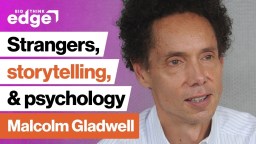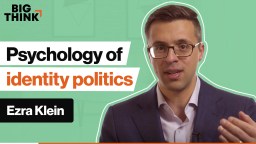BILL NYE: How do I recommend reasoning with a conspiracy theorist?
MICHIO KAKU: Well, first of all I think there's a gene. I think there's a gene for superstition, a gene for hearsay, a gene for magic, a gene for magical thinking. And I think that when we were in the forest that gene actually helped us because nine times out of ten that gene was wrong. Superstition didn't work. But one time out of ten it saved your butt. That's why the gene is still here. The gene for superstition and magic. Now there's no gene for science. Science is based on things that are reproducible, testable. It's a long process the scientific method. It's not part of our natural thinking.
BILL NYE: I'm right now the last couple of months I've been messing around with this idea of cognitive dissonance. This is to say you have a world view. You're presented with evidence that conflicts with the world view so you either have to change your world view, which is hard because you've lived your whole life with it, or you just dismiss the evidence and dismiss the authorities that may have provided the evidence. The authority could be a person or it could be a book or, excuse me, an article on the electric internet computer machine. So you dismiss the evidence so that you don't have this discomfort, this conflict in your mind, this dissonance.
SARAH ROSE CAVANAGH: But we can also see it in conspiracy thinking where these fringe groups or at least they used to be fringe groups on kind of the outskirts of thinking about what could be real or what is happening, paranoid thinking for instance. Thinking about reptoids controlling our government. There have always been people who believed these sort of strange things but what social media and the internet in general has allowed to happen is for people with these beliefs to find each other and then when they're hearing back those same sorts of facts, those same sorts of theories then their beliefs strengthen.
MICHAEL SHERMER: What the skeptical movement has developed is a set of tools like the baloney detection kit. A set of tools to deal with particular claims that are on the margins of science like creationism, intelligent design theory, the anti-vaccinations, the holocaust revisionists. All these conspiracy theories and so on and all these alternative medicines. There's hundreds and hundreds of these claims that are all connected to different sciences. But the scientists in those particular fields are too busy working in their research to bother with what these claims are because the claims really aren't about those fields. They're just hooked to them. They're about something else.
CAVANAGH: I think that fear is an incredibly dangerous emotion. I think that it causes us to narrow our thinking. I think it causes us to shutdown options and there are a lot of threats in the world but I think what we need to face those threats are open, creative, playful thinking. And when we think as a hive mind, when we think collectively and we do so in a fearful sense then that shuts down a lot of our thinking.
KAKU: It's a struggle. It's a struggle that's eternal because it's part of our genetic makeup, okay. And there's even a name for some of this superstition. It's called pareidolia. What is pareidolia? It's the idea that when you look in the sky you see things that are not there. Let's do an experiment. Look at the clouds and try not to see something there. It's very difficult. You look at the clouds, you can't help it. You see Donald Duck. You see Mickey Mouse. You see snakes, animals. You see all sorts of stuff. You can't help it. Recently the Notre Dame Cathedral partially burned down and sure enough somebody said I see Jesus Christ there. I saw the picture, maybe you did too. It really did look like Jesus Christ, but it was the ashes of Notre Dame. And how many times do people see the Virgin Mary in a glass of tea. So we are hardwired to see things that are not there because for the most part they're harmless. For the most part they do nothing and once in a while it saves our butt. And so that's why I think we will have flat-Earthers. We will have the people who don't like vaccinations because hearsay through human history was a dominant form of information sharing.
CAVANAGH: One thing that I think we tend to do is we think that we're going to be the person who is going to crack a big mystery, who is going to solve a whole puzzle. I think that Hollywood has given us this idea and the famous book and movie, "The Da Vinci Code," sold us on this that we were going to be the hero who would figure everything out, this big vast conspiracy and I think the romanticization of that is dangerous and I think that we all think that we're going to be this hero who's going to discover some secret thing.
SHERMER: People find comfort in sort of attenuating the anxiety or uncertainty they're feeling by concocting some overarching plan. This is what's going on. Now I understand it. Now I don't have to feel so uncertain about the environment. So people concoct conspiracy theories for that main reason.
JOHN CAMERON MITCHELL: Think about it. Are you only believing conspiracy theories because you want them to be true? That's when you know there's trouble.
BILL NYE: Apparently the way to overcome that is to say we're all in this together. Let's learn about this together. Present the conspiracy theorist with the idea that he or she may be rejecting evidence because it's just so uncomfortable. And you're in it together. We're in it together. I'm uncomfortable too. But when it comes to moon landings just ask the person how you would generate all that paperwork. The warehouses full of documentation that NASA created to make landings on the moon would overwhelm anybody trying to do it on the side. It would just be very difficult to print all that. And just understand it's a process. Somebody who has a world view that's inconsistent with evidence and I may have some, it takes a while for you to turn around. Like the example of palm reading or astrology it's not something people reverse their ideas about immediately. In my experience it takes about two years for somebody to sort of look at palm reading, look at cold reading or a tarot card reading for a while and then realize that these tarot card readers, palm readers are just taking information that you've given them, the client has given them and feeding it back to you.
SHERMER: The further out you go in the extreme nature of a conspiracy theory the less likely the theory is to be true. The more people that have to be involved in the conspiracy theory, the less likely it is to be true. The more elements that have to come together just at the right moment to make the conspiracy work, the less likely it is to be true. And the more global it is, you know, world domination, that sort of thing, the less likely it is to be true. Conspiracies usually are very narrowly focused like insider trading or corporate manipulation like Volkswagen with the emissions or some government attempting to manipulate an election. It's a very specific thing that the conspiracy is really about.
MITCHELL: The way we get the information 24 hour bombardment makes people feel afraid and you've got a lot of people who feel like dangerous shut-ins who are railing against how said things are or dropping out because they're overwhelmed. And because of that dropout and that polarization you get a regime like Trump. You get a fertile ground for fascism which is about blaming someone irrationally for other problems in your life. It's an old game that has been played for millennia. That immigrant, that transgender person, that person who is of a different race their very existence threatens you because they're getting attention, money. They're stealing something from you and that certainly found its way into a World War II, but also the fragile state of truth right now which also comes out of digital addiction is that all conspiracy theories are true. All news is suspect. Facts are fungible. And in a world like that, that's the biggest danger.
SHERMER: The problem is this. None of us has the truth. The only way to find out if you're deceiving yourself or not, if you've gone off the rails, if you're wrong in some way is to listen to other people who disagree with you. These were the original arguments laid down by John Stuart Mill, 1859, "On Liberty," this is the classic work. One, I might be partially wrong and so by listening to somebody who disagrees with me I get to correct my idea. Two, I might be completely wrong and off the rails and boy, good thing I figured this out before I went too far. Three, I might be completely right but I'm not 100 percent sure about my arguments and hearing somebody on the other side helps me refine my arguments and strengthen my arguments. If I can refute that conservative or that radical leftist or whoever it is then how much stronger my position is. And four, it's not just the speaker's right to speak. It's the listeners right to listen. Maybe I, the protester don't want to hear this person but maybe there's people in the room that do want to hear this person for whatever reasons. It's none of my business. And then finally in terms of moral progress that I like to track. One of the biggest drivers for the last five centuries has been the principle of free speech. This is at the basis of all liberal democracies of all civil societies that everybody must have the freedom to express their points of view no matter how much we dislike them. I don't care if you're a Nazi or you think we didn't land on the moon or whatever your ideas are. Go ahead and tell us your best arguments and we'll see in the marketplace of ideas how well you do.
KAKU: You know the internet is very new. Newspaper are very new. Science and technology is very new. But gossip, hearsay, slander, rumors there's a gene for that, okay. So how do you combat it? Slowly, carefully, painfully. It's a painful process but in some sense we're going up against our genetic predisposition to believe in nonsense.
MITCHELL: In some ways we're in a better world than we've ever been in terms of health and human rights at least being considered in different countries and partly that's because of digital stuff. You can't actually shutdown digital communication no matter how hard you try in China or wherever. There's VPNs. People get through. So there are advantages to that.
CAVANAGH: I think that we need to let experts weigh in and I think that we need to trust expertise and I think that we need to look at Snopes.com rather than YouTube for our information. I think that we need to regain our trust and scientists and then people who have spent their life's work studying a phenomena rather than thinking we're going to hunt down the answer on the internet.
SHERMER: This whole idea of what we now call fake news, alternative facts has gotten bigger and bigger and it just gets unfolded in real time online within minutes and hours. And we have to jump on it fast. But also developing a set of tools that can apply to any future ideas because I don't know what's going to be popular in five years from now. Heck, I don't know what's going to be trending tomorrow.
BILL NYE: People just lost sight of history and we all tend to go well, look at the facts. Change your mind. But it takes people a couple of years.
MITCHELL: Consider your conspiracy theories. You have a problem with them if you only believe the ones you want to.






